- Home
- Roger Zelazny
Isle Of The Dead Page 6
Isle Of The Dead Read online
Page 6
"Do you think I stole the tapes?" I asked.
He crossed and uncrossed his legs, looked away.
"You'll admit there's a pattern, and that it seems somehow related to you?"
"Yes. But I didn't do it."
"You'll admit that you were investigated and charged at one time for attempting to bribe a government official in order to obtain the tape for your first wife, Katherine?"
"It is a matter of public record, so I can't deny it. But the charges were dismissed," I said.
"True--because you could afford a lot of bad publicity and good lawyers, and you hadn't succeeded in obtaining the tape, anyway. It was later stolen, though, and it was years before we discovered that it hadn't been destroyed on the scheduled date. There was no way of linking it to you, or of obtaining jurisdiction in the place you were then residing. There was no other way of reaching you, either."
I smiled at his accent on the word "reaching." I, too, have a security network.
"And what do you think I would have done with the tape, had I obtained it?"
"You're a wealthy man, Mister Sandow--one of the few who could afford to duplicate the machinery necessary for Recall. And your training--"
"I'll admit I once had that in mind. Unfortunately, I didn't obtain the tape, so the attempt was never made."
"Then how do you explain the others? The subsequent thefts which occurred over several centuries, always involving friends or enemies of yours."
"I don't have to explain," I said, "because I don't owe you an explanation for anything I do. But I will tell you this: I didn't do it. I don't have the tapes, never had them. I had no idea up until now that they were missing."
But, Good Lord! _They_ were the six!
"Then accepting that as true, for the moment," he said, "can you supply us with any sort of lead as to who might have had sufficient interest in these people to go to such extremes?"
"I cannot," I said, seeing the Isle of the Dead in my mind's eye, and knowing that I would have to find out.
"I feel I should point out," said Briggs, "that this case will never be closed on our books until we have been satisfied as to the disposition of the tapes."
"I see," I said. "Would you mind telling me how many unclosed cases you're carrying on your books at the present time?"
"The number is unimportant," he said. "It's the principle involved. We never give up."
"It's just that I heard there were quite a few," I said, "and that some of them are getting pretty moldy."
"I take it you won't cooperate?"
"Not 'won't.' Can't. I don't have anything to give you."
"And you won't return to Earth with me?"
"To hear your chief repeat everything you've just said to me? No thanks. Tell him I'm sorry. Tell him I'd help if I could, but I don't see any way I can."
"All right. I guess I'll be leaving then. Thanks for the dinner."
He rose.
"You might as well stay overnight," I said, "and get a decent night's sleep in a comfortable bed before you shove off."
He shook his head.
"Thanks, but I can't. I'm on per diem, and I have to account for all the time I spend on a job."
"How do they calculate per diem when you're in subspace?"
"It's complicated," he said.
* * *
So I waited for the mailman. He's a big fac-machine who picks up messages beamed to Homefree and turns them into letters and gives them to S & F, who sorts them and drops them into my basket. While I waited, I made my preparations for the visit to Illyria. I'd followed Briggs every step of the way. I'd seen him to his vessel and monitored its departure from my system. I supposed I might see him again one day, or his chief, if I found out what had really happened and made it back home. It was obvious that whoever wanted me on Illyria had not set the thing up for purposes of throwing a party on my behalf. That's why my preparations mainly involved the selection of weapons. As I picked and chose from among the smaller of the deadlies in my arsenal, I thought some thoughts of Recall.
Briggs had been right, of course. Only a wealthy man could afford to duplicate the expensive Recall equipment housed in Dallas. Some research would be involved, too, for a few of the techniques were still classified. I sought candidates from among my competitors. Douglas? No. He hated me, but he wouldn't go to such elaborate ends to nail me if he ever decided it was worthwhile. Krellson? He'd do it, if he could; but I kept him under such close surveillance that I was certain he hadn't had the opportunity for anything of this magnitude. The Lady Quoil of Rigel? Virtually senile by now. Her daughters ran her empire and wouldn't humor such an expensive request for revenge, I was sure. Who then?
I checked my records, and they didn't show recent transactions. So I sent a courier-gram to the Central Registration Unit for that stellar district. Before the answer came back, however, I received Marling's reply to my message from Driscoll.
"_Come to Megapei immediately_," it said, and that was all. None of the formal flourishes characteristic of Pei'an writing style were present. Only that single, bald statement. It was the keynote of urgency. Either Marling was worse off than he'd suspected or my query had struck something big.
I arranged for CRU's message to be forwarded to me in Megapei, Megapei, Megapei, and then I was gone.
IV
Megapei. If you're going to pick a place to die, you might as well pick a comfortable one. The Pei'ans did, and I consider them wise. It had been a pretty desolate place, I'm told, when they found it. But they refurbished it before they moved in and settled down to the business of dying.
Megapei's around seven thousand miles through the middle, with two big continents in the northern hemisphere and three small ones to the south. The larger of the northern ones looks like a tall teapot tilted to pour (the handle broken at the top), and the other resembles an ivy leaf from which some hungry caterpillar took a big, northwestern bite. These two are about eight hundred miles apart, and the bottom of the ivy leaf dips about five degrees into the tropic zone. The teapot is around the size of Europe. The three continents in the southern hemisphere look like continents; that is to say, irregular chunks of green and gray surrounded by a cobaIt sea, and they don't remind me of anything else. Then there's lots of little islands and a few fairly large ones scattered all about the globe. The icecaps are small and keep pretty much to themselves. The temperature is pleasant, as the ecliptic and the equator are fairly close. The continents all possess bright beaches and peaceful mountains, and any pleasant habitation you care to imagine somewhere in between. The Pei'ans had wanted it that way.
There are no large cities, and the city of Megapei on the continent of Megapei, there on Megapei, is therefore not a large city. (Megapei the continent is the chomped ivy leaf. Megapei the city lies on the sea in the middle of the chomp.) No two habitations within the city are nearer than a mile from one another.
I orbited twice, because I wanted to look down and admire that handiwork. I still couldn't spot a single feature which I'd have cared to change. They were my masters when it came to the old art, always would be.
Memories poured back, of the gone happy days before I'd become rich and famous and hated. The population of the entire world was less than a million. I could probably lose myself down there, as once I had, and dwell on Megapei for the rest of my days. I knew I wouldn't. Not yet, anyhow. But sometimes it's pleasant to daydream.
On my second pass, I entered the atmosphere, and after a time the winds sang about me, and the sky changed from indigo to violet to a deep, pure azure, with little wisps of cirrus hovering there between being and nothingness.
The stretch on which I landed was practically Marling's back yard. I secured the ship and walked toward his tower, carrying a small suitcase. It was about a mile's distance.
As I walked the familiar trail, shaded by broad-leafed trees, I whistled once, lightly, and a bird-call mimicked my note. I could smell the sea, though I could not yet view it. All was as it had been,
years before, in the days when I had set myself the impossible task and gone forth to wrestle the gods, hoping only for forgetfulness, finding something far different.
Memories, like stained slides, suddenly became illuminated as I encountered, successively, an enormous, mossed-over boulder, a giant _parton_ tree, a _crybbl_ (an almost-lavender greyhound-like creature the size of a small horse, with long lashes and a crown of rosy quills), which quickly bounded away, a yellow sail--when the sea came into view--then Marling's pier, down in the cove, and finally the tower itself, entire, mauve, serene, severe and high, above the splashing, below the sunrich skies, clean as a tooth and far, far older than I.
I ran the last hundred yards and banged upon the grillwork that covered the arched way into the small courtyard.
After perhaps two minutes, a strange young Pei'an came and stood and regarded me from the other side. I spoke to him in Pei'an. I said: "My name is Francis Sandow, and I have come to see _Dra_ Marling." At this, the Pei'an unlatched the gate and held it open. Not until I had entered (for such is their custom) did he answer: "You are welcome, _Dra_ Sandow. _Dra_ Marling will see you after the tidal bell has rung. Let me show you to a place of rest and bring you refreshment." I thanked him and followed him up the winding stair.
I ate a light meal in the chamber to which he had conducted me. I still had more than an hour until the turning of the tide, so I lit a cigarette and stared out over the ocean through that wide, low window beside the bed, my elbows upon the sill that was harder than intermetallide plastic, and gray.
Strange to live like this, you say? A race capable of damn near anything, a man named Marling capable of building worlds? Maybe. Marling could have been wealthier than Bayner and I put together and multiplied by ten, had he chosen. But he'd picked a tower on a cliff overlooking the sea, a forest at his back, and he decided to live there till he died, and was doing it. I will trace no morals, such as a drawing away from the overcivilized races who were flooding the galaxy, such as repugnance for any society at all, even that of one's fellows. Anything would be an oversimplification. He was there because he wanted to be there, and I cannot go behind the fact. Still, we are kindred spirits, Marling and I, despite the differences in our fortresses. He saw that before I did, though how he could tell that the power might dwell in the broken alien who'd turned up on his doorstep one day, centuries before, is something that I do not understand.
Sick of wandering, frightened by Time, I had gone to seek counsel of what was said to be the oldest race around. How frightened I had become, I find it hard to describe. To see everything die--I don't think you know what it's like. But that's why I went to Megapei. Shall I tell you a little of myself? Why not? I told me again, as I waited for the bell.
I was born on the planet Earth, into the middle of the twentieth century, that period in the history of the race when man succeeded in casting off many of the inhibitions and taboos laid upon him by tradition, reveled for a brief time, and then discovered that it didn't make a bloody bit of difference that he had. He was still just as dead when he died, and he still was faced with every life-death problem that had confronted him before, compounded by the fact that Maithus was right. I left my indefinite college major at the end of my sophomore year to enlist in the Army, along with my younger brother who was just out of high school. That's how I found Tokyo Bay. Afterwards, I returned to school for a degree in engineering, decided that was a mistake, returned again to pick up the requirements for medical school. Somewhere along the line, I got sidetracked by the life sciences, went on for a master's in Biology, kept pursuing a growing interest in ecology. I was twenty-six years old and the year was 1991. My father had died and my mother had remarried. I had fallen for a girl, proposed to her, been rebuffed, volunteered for one of the first attempts to reach another star system. My mixed academic background got me passage, and I was frozen for a century's voyage. We made it to Burton, began setting up a colony. Before a year's time, however, I was stricken by a local disease for which we lacked a cure, not to mention a name. I was then refrozen in my cold bunker, to await some eventual therapy. Twenty-two years later, I came around. There had been eight more shiploads of colonists and a new world lay about me. Four more shiploads arrived that same year, and only two would remain. The other two were going on to a more distant system, to join an even newer colony. I got passage by trading places with a colonist who'd chickened out on the second leg of the flight. It was a once-in-a-lifetime opportunity, or so I thought, and since I could no longer recall the face--let alone the name--of the girl who had caused me to make the initial move, my desire to go on was predicated, I am certain, solely upon curiosity and the fact that the environment in which I then found myself had already been somewhat tamed, and I had had no part in its taming. It took a century and a quarter of cold sleep to reach the world we then sought, and I didn't like the place at all. That's why I signed up for a long haul, after only eight months--a two hundred seventy-six year journey out to Bifrost, which was to be man's farthest outpost, if we could make a go of it. Bifrost was bleak and bitter and scared me, and convinced me that maybe I wasn't meant to be a colonist. I made one more trip to get away, and it was already too late. People were suddenly all over the place, intelligent aliens were contacted, interstellar trips were matters of weeks and months, not centuries. Funny? I thought so. I thought it was a great joke. Then it was pointed out to me that I was possibly the oldest man alive, doubtless the only survivor of the twentieth century. They told me about the Earth. They showed me pictures. Then I didn't laugh any more, because Earth had become a different world. I was suddenly very alone. Everything I had learned in school seemed medieval. So what did I do? I went back to see for myself. I returned to school, discovered I could still learn. I was scared, though, all the time. I felt out of place. Then I heard of the one thing that might give me a wedge in the times, the one thing that might save me the feeling of being the last survivor of Atlantis walking down Broadway, the one thing that might make me superior to the strange world in which I found myself. I heard of the Pei'ans, a then recently discovered race to whom all the marvels of the twenty-seventh century on Earth--. including the treatments which had added a couple centuries to my life-expectancy--would seem like ancient history. So I came to Megapei, Megapei, Megapei, half out of my mind, picked a tower at random, called out at the gate till someone responded, then said, "Teach me, please."
I had gone to the tower of Marling, all unknowing at the time--Marling, of the twenty-six Names that lived.
When the tidal bell rang, the young Pei'an came for me and he conducted me up the winding stair to the top. He stepped into the room, and I heard Marling's voice greet him.
"_Dra_ Sandow is here to see you," he replied.
"Then bid him enter."
The young Pei'an returned through the door and said, "He bids you enter."
"Thank you."
I went in.
Marling was seated with his back to me, facing out the window toward the sea, as I knew he would be. The three large walls of his fan-shaped chamber were a pale green, resembling jade, and his bed was long, low and narrow. One wall was an enormous console, somewhat dusty. And the small; bedside table, which might not have been moved in centuries, still held the orange figurine resembling a horned dolphin leaping.
"_Dra_, good afternoon," I said.
"Come over here where I can see you."
I rounded his chair and stood before him. He was thinner and his skin was darker.
"You came quickly," he said, his eyes moving across my face.
I nodded.
"You said 'immediately.'"
He made a hissed, rattling sound, which is a Pei'an chuckle, then, "How have you been treating life?"
"With respect, deference and fear."
"What of your work?"
"I'm between jobs just now."
"Sit down."
He indicated a bench alongside the window, and I crossed to it.
"Tell me wha
t has happened."
"Pictures," I said. "I've been receiving pictures of people I used to know--people who have been dead for some time now. All of them died on Earth, and I recently learned that their Recall Tapes were stolen. So it's possible that they _are_ alive, somewhere. Then I received this."
I handed him the letter signed "Green Green." He held it close and read it slowly.
"Do you know where the Isle of the Dead is?" he asked.
"Yes; it's on a world I made."
"You are going?"
"Yes. I must."
"Green Green is, I believe, Gringrin-tharl of the city Dilpei. He hates you."
"Why? I don't even know him."
"That is unimportant. Your existence offends him, so naturally he wishes to be avenged for this affront. It is sad."
"I'd say so. Especially if he succeeds. But how has my existence served to offend him?"
"You are the only alien to be a Name-bearer. At one time it was thought that none but a Pei'an could master the art you have learned--and not too many Pei'ans are capable, of course. Gringrin undertook the study and he completed it. He was to have been the twenty-seventh. He failed the final test, however."
"The _final_ test? I'd thought that one pretty much a matter of form."
"No. It may have seemed so to you, but it is not. So, after half a century of study with Deigren of Dilpei, he was not confirmed in the trade. He was somewhat exercised. He spoke often of the fact that the last man to be admitted was not even Pei'an. Then he departed Megapei. With his training, of course, he soon grew wealthy."
"How long ago was that?"
"Several hundred years. Perhaps six."
"And you feel hess been hating me all this time, and planning revenge?"

 Seven Tales in Amber
Seven Tales in Amber Frost and Fire
Frost and Fire Doorways in the Sand
Doorways in the Sand Unicorn Variation
Unicorn Variation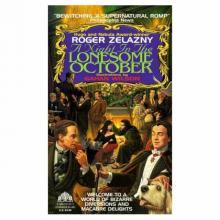 A Night in the Lonesome October
A Night in the Lonesome October Madwand
Madwand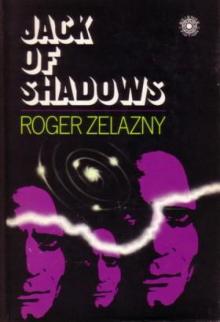 Jack Of Shadows
Jack Of Shadows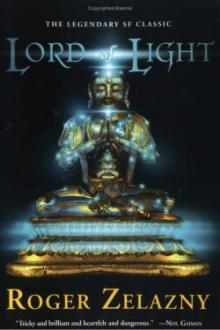 Lord of Light
Lord of Light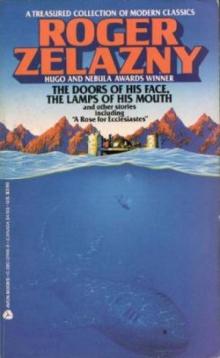 The Doors of His Face, The Lamps of His Mouth and Other Stories
The Doors of His Face, The Lamps of His Mouth and Other Stories Guns Of Avalon tcoa-2
Guns Of Avalon tcoa-2 Coils
Coils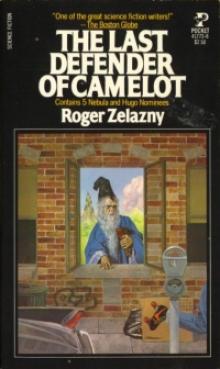 The Last Defender Of Camelot
The Last Defender Of Camelot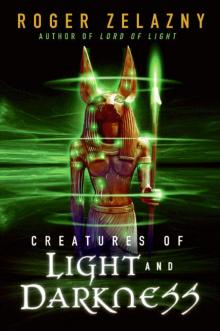 Creatures of Light and Darkness
Creatures of Light and Darkness This Immortal
This Immortal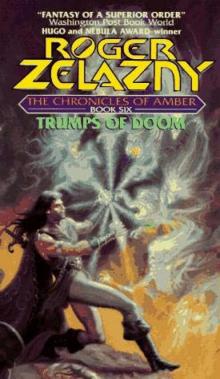 Trumps of doom tcoa-6
Trumps of doom tcoa-6 The Dream Master
The Dream Master The Complete Dilvish, The Damned
The Complete Dilvish, The Damned Nine Princes in Amber
Nine Princes in Amber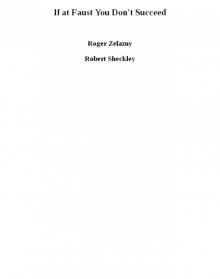 If at Faust You Don't Succeed
If at Faust You Don't Succeed Here there be dragons
Here there be dragons The Doors Of His Face, The Lamps Of His Mouth
The Doors Of His Face, The Lamps Of His Mouth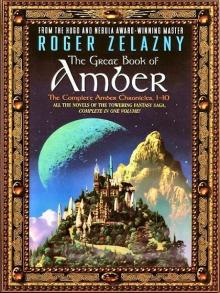 The Great Book of Amber - Chronicles 1-10
The Great Book of Amber - Chronicles 1-10 Madwand (Illustrated)
Madwand (Illustrated)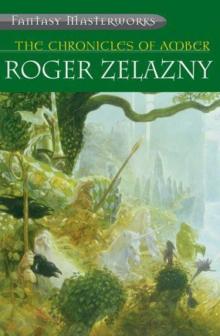 The Chronicles of Amber
The Chronicles of Amber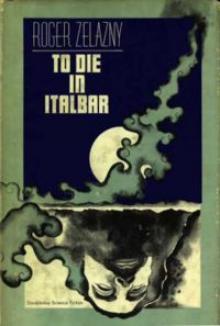 To Die In Italbar
To Die In Italbar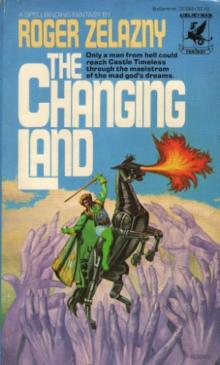 The Changing Land
The Changing Land The Furies
The Furies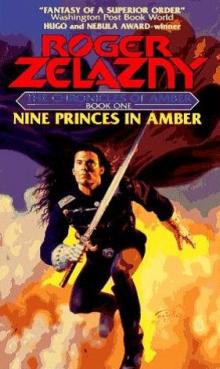 Nine Princes In Amber tcoa-1
Nine Princes In Amber tcoa-1 Last Of The Wild Ones
Last Of The Wild Ones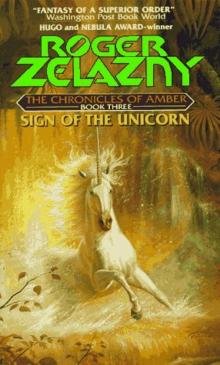 Sign of the Unicorn tcoa-3
Sign of the Unicorn tcoa-3 My Name is Legion
My Name is Legion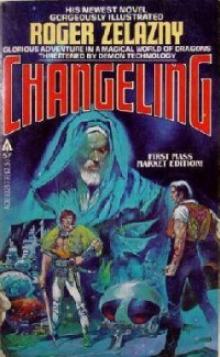 Wizard World 1: Changeling
Wizard World 1: Changeling Changeling
Changeling The Shroudling and the Guisel (amber stories)
The Shroudling and the Guisel (amber stories)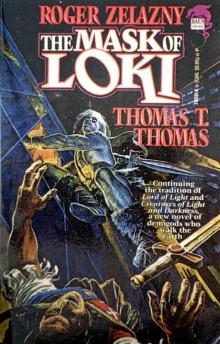 The Mask of Loki
The Mask of Loki A Farce To Be Reckoned With
A Farce To Be Reckoned With Roadmarks
Roadmarks When Pussywillows Last in the Catyard Bloomed (rtf)
When Pussywillows Last in the Catyard Bloomed (rtf) Hall of Mirrors (amber stories)
Hall of Mirrors (amber stories) Permafrost
Permafrost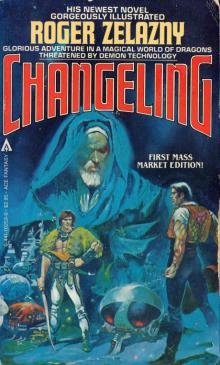 Changeling (Illustrated)
Changeling (Illustrated) Donnerjack
Donnerjack Shadows & Reflections: A Roger Zelazny Tribute Anthology
Shadows & Reflections: A Roger Zelazny Tribute Anthology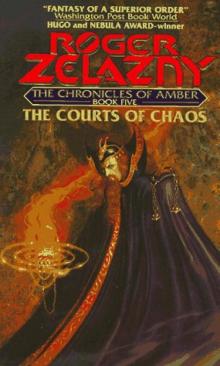 The Courts Of Chaos tcoa-5
The Courts Of Chaos tcoa-5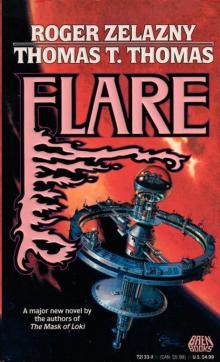 Flare
Flare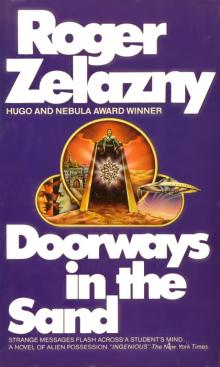 Doorsways in the Sand
Doorsways in the Sand The Great Book of Amber
The Great Book of Amber Home Is the Hangman
Home Is the Hangman For a Breath I Tarry
For a Breath I Tarry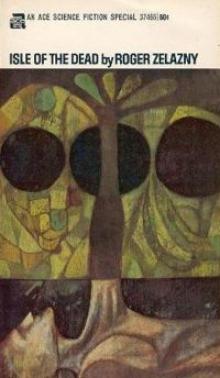 Isle Of The Dead
Isle Of The Dead Salesman Tale (amber stories)
Salesman Tale (amber stories) Dismal Light
Dismal Light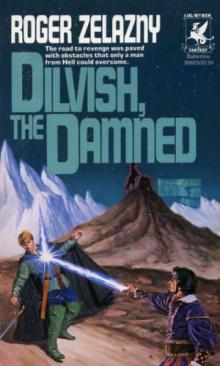 Dilvish, The Damned
Dilvish, The Damned The Black Throne
The Black Throne Wizard World 2: Madwand
Wizard World 2: Madwand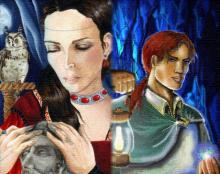 The Salesman's Tale
The Salesman's Tale